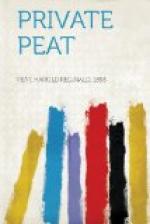These two miles had to be covered and covered quickly. We had to save the British extreme right wing, and we had to close the gap. There was no question about it. It was our job. On the night of April twenty-second we commenced to put this into effect. We were still holding our original position with the handful of men who were in reserves, all of whom had been included in the original grand total of twelve thousand. We had to spread out across the gap of two miles and link up the British right wing.
Doing this was no easy task. Our company was out first and we were told to get into field skirmishing order. We lined up in the pitchy darkness at five paces apart, but no sooner had we reached this than a whispered order passed from man to man: “Another pace, lads, just another pace.”
This order came again and yet again. Before we were through and ready for the command to advance, we were at least twice five paces each man from his nearest comrade.
Then it was that our captain told us bluntly that we were obviously outnumbered by the Germans, ten to one. Then he told us that practically speaking, we had scarcely the ghost of a chance, but that a bluff might succeed. He told us to “swing the lid over them.” This we did by yelling, hooting, shouting, clamoring, until it seemed, and the enemy believed, that we were ten to their one.
[Illustration: LINES AS THEY APPEARED, APRIL 24 BADLY BENT BUT NOT BROKEN]
The ruse succeeded. At daybreak when we rested we found that we had driven the enemy back almost to his original position. All night long we had been fighting with our backs to our comrades who were in the front trenches. The enemy had got behind us and we had had to face about in what served for trenches. By dawn we had him back again in his original position, and we were facing in the old direction. By dawn we had almost, though not quite, forced a junction with the British right.
The night of April twenty-second is one that I can never forget. It was frightful, yes. Yet there was a grandeur in the appalling intensity of living, in the appalling intensity of death as it surrounded us.
The German shells rose and burst behind us. They made the Yser Canal a stream of molten glory. Shells fell in the city, and split the darkness of the heavens in the early night hours. Later the moon rose in a splendor of spring-time. Straight behind the tower of the great cathedral it rose and shone down on a bloody earth.
Suddenly the grand old Cloth Hall burst into flames. The spikes of fire rose and fell and rose again. Showers of sparks went upward. A pall of smoke would form and cloud the moon, waver, break and pass. There was the mutter and rumble and roar of great guns. There was the groan of wounded and the gasp of dying.
It was glorious. It was terrible. It was inspiring. Through an inferno of destruction and death, of murder and horror, we lived because we must.




